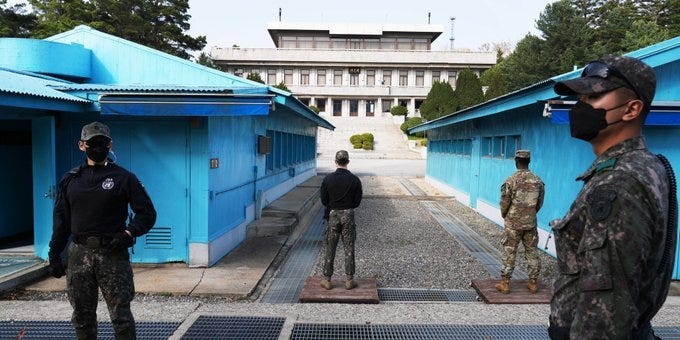Tensions on the Korean Peninsula: Travis King's Run INTO North Korea, Biden's Nuclear Subs, and the Imperative for Military Realignment
Exploring the Implications of U.S. Military Presence and the Path to Regional Stability
This week on the Korean Peninsula has been tense. The unauthorized entry of a U.S. soldier into North Korea assumed to be detained by the North Korean military, and North Korea's missile launches in response to the Biden Administration's decision to station nuclear-armed U.S. submarines in Busan, South Korea, add complexity to an already tumultuous geopolitical situation here in Korea.
Events like the war game drills this summer between the U.S. and ROK militaries on North Korea's border contribute to the persistent demands of North Korea to remove U.S. military forces from South Korea, fuel debates about the appropriate response to achieve peace on the Korean Peninsula both here and abroad.
One thing is sure, the old way of dealing with North Korea is not working, and the next presidential administration of the U.S. must make changes in this regard if peace and democracy throughout the Peninsula are indeed the hope and goals. This change means thinking outside the box of incentivizing military equipment suppliers to profit from the endless military presence here, which means considering removing the U.S. military from South Korea. U.S. military presence in South Korea is the primary purpose of North Korea's cause for existence, at least in their reality. Remove the cause, and the regime must find another reason to justify remaining in place as it is with its citizens. Historically, this would be a fantastic place to arrive, as it would be the essential pretext for advancing democracy in the DPRK.
It is essential to recognize that the United States military strategic realignment represents a prudent and wise long-term approach to fostering regional stability and securing a lasting peace, all while preventing the escalating potential for nuclear war where over a million people are projected to die in the first 24 hours should war break out on the Korean Peninsula according to the Pentagon.
In pursuit of peace, the United States must take the higher road, rising above the confrontational rhetoric. While the perception would be that the United States is accommodating North Korea's demands to remove its military from South Korea, the reality is far more nuanced. By carefully considering the long-term implications of military realignment (not synonymous with removal), the United States is playing the wise and prudent long game, focusing on strategic foresight rather than being swayed by immediate provocations. Strategic realignment offers an opportunity to recalibrate the relationship on the Korean Peninsula.
By moving beyond the reactive response to North Korea's demands, the United States demonstrates its commitment to a measured and calculated approach. This approach acknowledges the complex dynamics at play and considers the interests of all regional stakeholders, including South Korea and other allies. By maintaining a presence in Guam and allied nations like Japan, the United States can continue to uphold its security commitments while navigating the intricacies of the geopolitical landscape here.
Furthermore, pursuing this prudent long-term strategy allows the United States to focus on comprehensive peace-building efforts. This requires patience, resilience, and a clear vision beyond immediate concessions and confrontational posturing that have only led to further military escalations inching us closer to genuine nuclear feasibility.
It is important to note that strategic realignment does not imply a disregard for the security concerns of South Korea or the broader region. On the contrary, it emphasizes the need for a comprehensive approach that takes into account the evolving nature of security threats and the importance of collective defense. By working closely with allies and partners, the United States can ensure that regional stability remains a top priority, even as military presence is repositioned.
The United States must rise above the demands put forth by North Korea and focus on the long-term interests of regional stability. Strategic realignment offers an opportunity to recalibrate the dynamics and navigate the region's complexities while upholding security commitments. By taking the higher road and playing a wiser, more prudent long game, the United States can lay the groundwork for lasting peace, fostering an environment that benefits all parties involved, including but not limited to the catastrophic impact of nuclear war.

